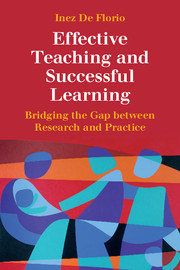Book contents
- Frontmatter
- Epigraph
- Contents
- Preface
- Introduction
- 1 Main Features of Scientific Research on Education
- 2 Important Types of Scientific Research on Education
- 3 Main Features of Evidence-based Research on Education
- 4 Meta-Analyses on Education
- 5 A Synthesis of Over 800 Meta-Analyses Relating to Achievement
- 6 Scaffolding Effective Teaching and Successful Learning
- 7 Planning and Starting the Lesson
- 8 Presenting Knowledge and Skills – Assertive Questioning
- 9 Guided and Independent Practice
- 10 Cooperative and Project-based Learning
- 11 Feedback – Reciprocal and Informative
- Concluding Remarks: Standards Need More Evidence
- References
- Index
Concluding Remarks: Standards Need More Evidence
Published online by Cambridge University Press: 05 June 2016
- Frontmatter
- Epigraph
- Contents
- Preface
- Introduction
- 1 Main Features of Scientific Research on Education
- 2 Important Types of Scientific Research on Education
- 3 Main Features of Evidence-based Research on Education
- 4 Meta-Analyses on Education
- 5 A Synthesis of Over 800 Meta-Analyses Relating to Achievement
- 6 Scaffolding Effective Teaching and Successful Learning
- 7 Planning and Starting the Lesson
- 8 Presenting Knowledge and Skills – Assertive Questioning
- 9 Guided and Independent Practice
- 10 Cooperative and Project-based Learning
- 11 Feedback – Reciprocal and Informative
- Concluding Remarks: Standards Need More Evidence
- References
- Index
Summary
My concluding remarks consist mainly of questions. Another book would be required to illustrate the answers, because up to now educational standards and evidence-based education have been discussed separately. How is it possible that those who preach evidence-based teaching do not look for scientific evidence of educational standards? Would it not be more reasonable to elaborate standards which are based on reliable research and not only on the suggestions of experts or policy makers? Why are performance standards not tested out with poor, low-level students in order to find out if these learners ever could reach them? The following considerations will hopefully bring us closer to answers. At least they are food for thought.
What does standardization of schools mean? Standardization has been introduced into industrial production and the field of services to guarantee that products and services all over the world correspond to the same requirements. When booking a four-star hotel you can expect similar equipment, facilities, and services in Aberdeen and in Shanghai. Not only hotels but also schools are standardized. In most countries, schooling is regulated in the same way: There are classes composed of students of approximately the same age. In general, teachers are professionally trained. Knowledge and skills are distributed along different subject matters. Quite often content is fixed by curricula, and there are timetables to be respected. Standards are instruments to create institutions which regulate the exchange among human individuals. In short: every characteristic that determines a school as an institution is to be considered a standard (Herzog, 2013, p. 4).
What are educational standards? There is a wide range of standards referring to teaching and learning, for example curriculum standards, learning standards, pupil achievement standards, instructional standards, teaching standards, proficiency standards, competence standards, and outcome standards. Before having a closer look at the most important educational standards and their possible influences on student outcome, we should remember the example of the coffee machine in Section 3.5. Even though the coffee drinker has an undeniable influence on the machine by filling it up with water and coffee, he does not direct or even regulate the machine as a system. This is done by a built-in algorithm. When we consider, furthermore, the effect of the coffee on the consumer, we must admit that there is no direct connection between the machine and the coffee drinker.
- Type
- Chapter
- Information
- Effective Teaching and Successful LearningBridging the Gap between Research and Practice, pp. 215 - 220Publisher: Cambridge University PressPrint publication year: 2016



